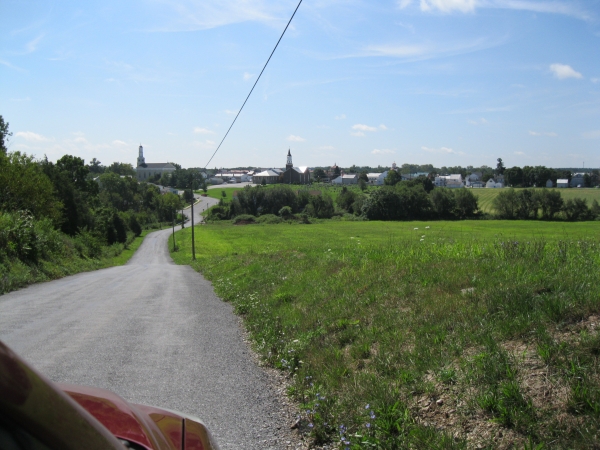
Modern view of Emmitsburg looking towards the general area that the 17th CVI camped on June 30, 1863.
I’ve always thought the best description of the 17th CVI immediately prior to fighting at Gettysburg was written by Company C’s J. Montgomery Bailey (AKA “High Private Manton”). Published by the Danbury Times as part of Bailey’s “Under Guard, OR, Sunny South in Slices” articles following his capture and subsequent release at Gettysburg. The entire series can be found on the site. Dick is Richard Taylor, a friend of Bailey’s, killed on the first day.
Here in Bailey’s words, the evening before Gettysburg:
I well remember the night of the 30th of June. The sky was clear of clouds and filled with bright glittering stars. The moon threw a calm, mellow light over our camp, and the surrounding hills. We were lying at Emmittsburg in Maryland, near the Pennsylvania border. We felt that our marching was about done for the present, and that we were on the eve of a heavy struggle. The solemnity which always foreruns a battle, pervaded our minds, intensifying our thoughts of home, and weaving shadows of anxiety across our future. The conflict was imminent. All through the day flying rumors came on all sides. Lee had destroyed Harrisburg, routed the militia, and was rapidly advancing on us by way of Gettysburg. I stood leaning against a camp stake, gazing dreamily across the hill, with mind reverting to Chancellorsville and filled with anticipations of a second edition so soon to be issued. In imagination I was amid the carnage, surrounded by gleaming bayonets and staggering wounded, while the air resounded with the unearthly hiss and whiz of shot and shell, and piercing cries of the mangled combatants. While thus wrapt in bloody glory, I felt a hand laid on my shoulder, and a familiar whisper greeted me with the question,
“What are you thinking of — home?”
I roused myself from the sad reverie and turning around, voluntarily grasped the inquirer’s hand.
“No, Dick, I am not thinking of home, exactly, but of what is coming.”
“Yes, we have got to fight, Mont,” was his quiet rejoinder, “and somebody has got to die. I hope it isn’t you nor me, though I don’t suppose we are any better than others.”
“It will be a hard battle,” I said. “The boys have made up their minds that if whipped here, there will be but little peace for our army the remainder of the summer.”
“We ought to fight now if ever,” he energetically exclaimed. “This Corps will run, I know — but Mont, the 17th must stand up to it and do something for Chancellorsville. I ain’t much, myself, and may run equal to the best Dutchman in the crowd, but I hope to God I will do my duty even if I do get shot.”
